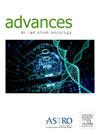Global Review of Tools Evaluating Quality of Life in Cervical Cancer Survivors Treated With Chemoradiation Therapy
IF 2.2
Q3 ONCOLOGY
引用次数: 0
Abstract
Purpose
This systematic review aimed to identify and compare tools used to evaluate quality of life (QoL) after pelvic radiation for cervical cancer and to describe variations in results within commonly used instruments. This review hypothesized regional preferences in the selection of these tools and an absence of uniformity in their application globally.
Methods and Materials
A comprehensive search of 6 databases was conducted between the inception of each included database and June 14, 2023, focusing on studies evaluating the QoL of patients with cervical cancer during and after radiation. Excluded were studies involving cancers originating outside the cervix, those not exclusively undergoing radiation or chemoradiation therapy, such as patients who have undergone surgery, and non-English studies.
Results
Ultimately, 229 studies covering 25,693 patients and 51 countries were identified. Most studies were conducted in Asia (35.6%) and Europe (32.9%). Ninety-nine QoL instruments were identified, not including those that were specific to a single study. The European Organisation for Research and Treatment of Cancer QoL Questionnaire Core 30 (20.5%) and the European Organization for Research and Treatment of Cancer (EORTC) QoL questionnaire cervical cancer module (16.0%) were the most commonly used; however, US-based studies primarily used the Functional Assessment of Cancer Therapy-General surveys. Furthermore, there was significant variability in the timelines of survey usage in relation to when treatment was completed, further limiting the comparisons that can be made. Of the 127 studies that reported data on the time points after completion of treatment at which QoL was measured, 72.4% measured QoL within 1 year of treatment completion, and 48.8% measured QoL >1 year after treatment completion, with some studies using multiple time points for their research.
Conclusions
This study revealed a fragmented landscape with significant variability in QoL survey use, limiting the generalizability and usefulness of these results to drive meaningful change. There is a need for a global standardized method to evaluate QoL after treatment of cervical cancer with radiation therapy for comparison across regions. Simplified tools may assist with the broader collection of data, which may lead to advancements for improvement of the QoL of these patients.
宫颈癌放化疗幸存者生活质量评估工具的全球综述。
目的:本系统综述旨在识别和比较用于评估宫颈癌盆腔放疗后生活质量(QoL)的工具,并描述常用仪器结果的差异。本综述假设在选择这些工具时存在区域偏好,并且在全球范围内的应用缺乏一致性。方法和材料:综合检索6个数据库,从每个数据库建立到2023年6月14日,重点研究宫颈癌患者放疗期间和放疗后生活质量的评价。排除了源自子宫颈外的癌症的研究,那些不完全接受放疗或放化疗的研究,例如接受过手术的患者,以及非英语研究。结果:最终确定了229项研究,涵盖了51个国家的25,693名患者。大多数研究在亚洲(35.6%)和欧洲(32.9%)进行。确定了99种生活质量工具,不包括那些特定于单一研究的工具。最常用的是欧洲癌症研究与治疗组织生活质量问卷核心30(20.5%)和欧洲癌症研究与治疗组织(EORTC)生活质量问卷宫颈癌模块(16.0%);然而,美国的研究主要使用了癌症治疗功能评估调查。此外,与治疗完成时间相关的调查使用时间表存在显著差异,进一步限制了可以进行的比较。在报告治疗完成后测量生活质量的时间点数据的127项研究中,72.4%的研究在治疗完成后1年内测量生活质量,48.8%的研究在治疗完成后1年内测量生活质量,有些研究使用多个时间点进行研究。结论:本研究揭示了生活质量调查使用的碎片化景观和显著的可变性,限制了这些结果的普遍性和有用性,以推动有意义的变化。需要一种全球标准化的方法来评估宫颈癌放射治疗后的生活质量,以便进行地区间的比较。简化的工具可能有助于更广泛的数据收集,这可能导致改善这些患者的生活质量的进展。
本文章由计算机程序翻译,如有差异,请以英文原文为准。
求助全文
约1分钟内获得全文
求助全文
来源期刊

Advances in Radiation Oncology
Medicine-Radiology, Nuclear Medicine and Imaging
CiteScore
4.60
自引率
4.30%
发文量
208
审稿时长
98 days
期刊介绍:
The purpose of Advances is to provide information for clinicians who use radiation therapy by publishing: Clinical trial reports and reanalyses. Basic science original reports. Manuscripts examining health services research, comparative and cost effectiveness research, and systematic reviews. Case reports documenting unusual problems and solutions. High quality multi and single institutional series, as well as other novel retrospective hypothesis generating series. Timely critical reviews on important topics in radiation oncology, such as side effects. Articles reporting the natural history of disease and patterns of failure, particularly as they relate to treatment volume delineation. Articles on safety and quality in radiation therapy. Essays on clinical experience. Articles on practice transformation in radiation oncology, in particular: Aspects of health policy that may impact the future practice of radiation oncology. How information technology, such as data analytics and systems innovations, will change radiation oncology practice. Articles on imaging as they relate to radiation therapy treatment.
 求助内容:
求助内容: 应助结果提醒方式:
应助结果提醒方式:


